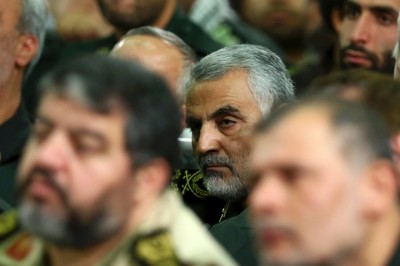Author Michael Young argues that ending violence in Syria and Iraq requires regional and international powers – including Iran – to face up to the realities of sectarian politics
The recent paperback launch of a book on Lebanon published four years ago might seem a strange move given the dramatic changes in the Middle East since 2010. But Michael Young’s The Ghost of Martyrs Square has stood up remarkably well not just as a sharp analysis and gripping narrative of the crucial period of 2005-2010 in Lebanon but as a strikingly topical example of a Middle Eastern country facing sectarian conflict.
Lebanon has often fallen victim to proxy battles between regional powers, especially Iran, Syria and Saudi Arabia, although the three also underwrote the 1989 Taef agreement that ended the 15-year civil war. The links between the country’s religious sects and these regional powers – or, in the case of Christians, the United States and France – have encouraged many Lebanese to question the country’s sect-based political system, which has developed, as Young points out, over several centuries.
Under this system, one can be a citizen only as a member of one of 18 recognised religious groups. The sects share out political positions, including parliamentary seats and the posts of president, prime minister and parliamentary speaker
But Young, who has lived in Lebanon since 1970 when his Lebanese mother took him home after the early death of his American father, has as journalist and author consistently defended Lebanon’s system as the best way of protecting the country’s pluralism and liberalism. For him, a country with a “forest of fathers” (as he puts it in The Ghosts of Martyrs Square) is “so much more tolerable that a place with a single father who cuts down the rest of the forest”.
With no one group able to rule alone, all are restrained.
“Lebanon is a paradoxically liberal country in an autocratic region because its illiberal institutions tend to cancel each other out in the shadow of a sectarian system that makes the religious communities and sects more powerful than the state – to me, the main barrier to personal freedom in the Middle East ….Sectarianism, in imposing communal balance and a weak state, has forced society, in particular the political leadership, to accept compromise and balance.”
“In Lebanon alone a formula was worked out to accept the reality of sectarianism and take advantages of the liberal openings it created.”
When the Arab spring broke out in Tunisia in December 2010 – more or less exactly as the “slice of time” covered in The Ghosts of Martyrs Square ended – there was a wave of optimism that a new Middle East based on citizenship, secularism and democracy would emerge. By then, however, the hopes of Lebanon’s Cedar Revolution of 2005 had already floundered.
In an interview with Tehran Bureau, Young recalls a “very idealistic view” during the Arab spring that a new “sense of Arab identity” was emerging that would sweep away sectarian politics like those underpinning the Lebanese system. Indeed, even before the Arab spring, many Iraqi reformers after the overthrow of Saddam Hussein in 2003 – some excited by the US administration’s talk of a wave of democracy – explicitly rejected anything smacking of the Lebanese example.
“When the [2003 Iraq] war ended,” says Young, “I was writing that the Lebanese model was worth investigating. The reaction was negative, one of ‘Who wants to be like Lebanon?’ My feeling then was the old Baathist order, based on repression, had been destroyed, and unless some mechanism was found to manage the complexity of Iraqi society, including its sectarian relations, then we would enter a much darker period.”
Eleven years later, the darker period has certainly arrived. Fuelled in part by Sunni anger at the Shia-led order in Baghdad, the Islamic State (Isis) has taken over swathes of Iraq, and is in control of much of Syria, where around 200,000 people have been killed in an increasingly sectarian war. Iran and its Lebanese ally Hezbollah are being drawn ever deeper into a regional Sunni-Shia conflict.
Young agrees that his book is partly a story of arrogance and unintended results, beginning with the murder in February 2005 of Rafik Hariri, the charismatic former prime minister of Lebanon. The Ghosts of Martyrs Square resonates with the urgency of those times:
“Hariri’s killing had struck me as astonishing. His enemies had gone too arrogantly far, without gauging the consequences.”
For Young, those who killed Hariri – who was effectively the leader of Lebanon’s Sunni Muslims – were fundamentally foolish in trying to upset the sectarian consensus on which Lebanon rested. In The Ghosts of Martyrs Square, Young argues the Syrian regime was the only possible culprit for the murder and he reviews evidence of Hezbollah’s involvement. The book makes a clear case that in the aftermath of Hariri’s killing, Syria, Hezbollah and Iran all upset the consensual, sectarian basis of Lebanese politics, with disastrous results.
Firstly, Syrian withdrawal from Lebanon after the popular demonstrations that followed Hariri’s death was followed by a series of assassinations of Syrian critics in Lebanon, including in June 2005 Young’s friend the journalist Samir Kassir.
Then Hezbollah asserted itself, firstly as the 2006 war between Israel and Hezbollah, which was provoked, Young reminds us, by the capture of two Israeli soldiers and then claimed by Hezbollah as a “divine victory”. Secondly, in 2008 Hezbollah carried through a military take-over of west Beirut after the government challenged its security role around Beirut airport.
The result was heightened tension between Lebanon’s sects:
“Here were the consequences of Hezbollah’s often expressed scorn for Lebanon’s sectarian system – and with that its willingness to disregard sectarian self-restraint …The religious communities, or their representatives, generally avoided head-on collisions to advance communal agendas, and when they did, the results were often disastrous. Hezbollah could be receptive to the dangers of sectarian conflict with the Sunnis …[but] it began pushing the envelope on what its adversaries found tolerable. The mood of mutual antagonism also came from a Sunni sense of vulnerability because the balance of Lebanese Muslim power was changing.”
“The masks had fallen, and Hezbollah, which had insisted it would never turn its weapons on fellow Lebanese, had done precisely that. The premise that the party was the vanguard of a national resistance against Israel, or against America, or against neo-colonial hegemony, or whatever, collapsed.”
There would be unintended effects, which are still playing out today.
“[W]hat was the practical pay-off of the Shiite denigration of Sunnis, and of Beirut itself? As Saad al-Hariri [who succeeded his father as leader of the main Sunni party, Mustaqbal] implied in a moment of disenchantment, if Hezbollah wanted to break the Sunni moderates, fine; let it face the extremists.”
Just as evident as Hezbollah’s search for sectarian advantage and political advantage, says Young, would be Iran’s efforts to exploit the uprisings of the Arab spring, which it hailed initially as an “Islamic awakening”. “When Egypt began to revolt against Mubarak, they [Iran] said this was positive, as it was negatively affecting the United States,” he says. “But then the Arab spring arrived in Syria, and suddenly their attitude was very different.”
Most cynical of all was Iran’s ally, Bashar al-Assad. “They [the Syrian regime] did something very reckless,” says Young, “in immediately using the full force of the Syrian army [against demonstrators], which turned these peaceful protests, which were about democracy, into violent protests. The regime had come to the conclusion that if this produced an armed insurrection, that what would emerge would be the most extreme sectarian forces in the opposition and that this would facilitate the military repression of the uprising and at the same time would create fears overseas that extremism was about to take over in Syria.”
But things slipped out of control. This was a situation Assad proved incapable of managing, despite later assistance from Iran’s Islamic Revolutionary Guard Corps and probably thousands of Hezbollah fighters. The Syrian war quickly became one between mainly Sunni rebels and an Allawi-led regime backed by Shia allies.
But Young does not believe Assad can avoid defeat. “Assad is losing the battle,” says Young. “The manpower of the minority Allawi community is not sufficient to sustain the battle indefinitely.”
In the meantime, the growth of militant Sunnism has spread from Syria to Iraq with the dramatic advance of Isis, whose prospects of taking hold in Syria are very real, says Young: “What if the Islamic State is one of the groups that takes over Damascus? Today they are at the doors of Baghdad. Much as the Syrian regime is detestable, what would happen if the Islamic State, or the al-Qaeda affiliate Jabhat al-Nusra, were to take over Damascus?”
Young argues that the only way back from the abyss is a new order, in both Syria and in Iraq, that recognises and openly takes into account sectarian realities and that, like the 1989 Taef agreement in Lebanon, is endorsed by regional and international powers. The specifics would be different in each country.
“If someone wants to think through a solution in Syria, we know the elements,” he says. “Whether there is a settlement today or in ten or 15 years, we have to recognise the Sunnis will not go back to Allawi rule. If you want to talk about a new social contract in Syria – you have to accept Bashar will go, or at least you have to accept a system that will ensure Bashar will go.”
The challenge is massive, and growing.
“If you want to put together a mechanism to stabilise Syria, you cannot ignore that nearly 200,000 people have been killed. You are always going to have someone saying, you cannot negotiate a solution to this, there has to be revenge… But the real problem today is that we don’t find any willingness by anyone to discuss political outcomes, and now you’ve had this added complication of the Islamic State. Now, the Sunni [led] states are very ambiguous about the Islamic State: they are part of a coalition fighting it, but they understand this is a big setback for Iran, so their willingness to go beyond a certain line is not as great.”
Young is far from hopeful that the United States will offer an effective lead.
“[President] Barack Obama never understood properly the dangers inherent in the Syrian situation. Obama wants to defeat the Islamic State but he doesn’t want to do anything about the conflict in Syria: he has separated artificially the anti-Islamic State campaign and the conflict in Syria, as if these things were not intimately tied into one another. Three years ago a number of people were writing – I was only one of them – that you cannot do nothing in Syria, because the problem you’re trying to avoid today may be become a problem later that you simply cannot avoid.”

But neither is Young optimistic that Iran accepts the need for new settlements in both Syria, recognising that Allawi rule is over, and in Iraq, with the Shia-led government acknowledging Sunni aspirations.
He cites a conversation in the summer with a leading Iraqi Shia politician: “He told a small group of us that after Mosul fell [to Isis in June] he’d asked Qassem Soleimani [head of Iran’s Quds intelligence force], ‘What are you going to do?’ And Soleimani responded, ‘We must rely on Shia solidarity’. This was very revealing. It wasn’t ‘Let’s try to rebuild consensus with the Sunni community to contain what’s going on’. It was a question of reinforcing the Shia axis.”
Gareth Smyth has reported from the Middle East since 1992 and was chief Iran correspondent of the Financial Times between 2003 and 2007



Leave a Reply
You must be logged in to post a comment.